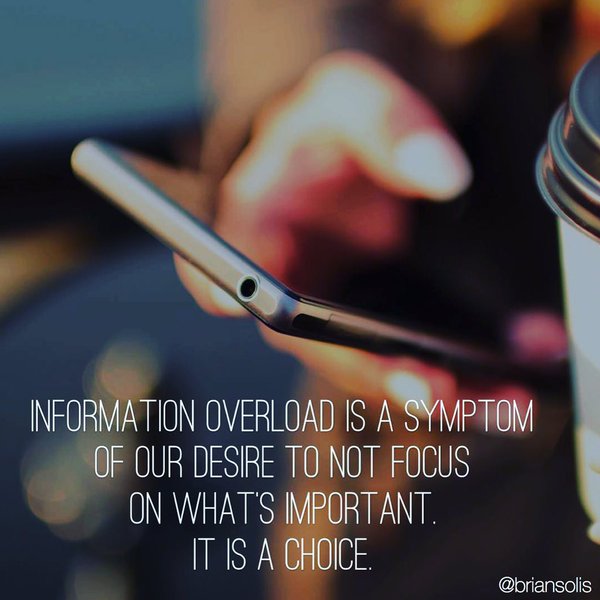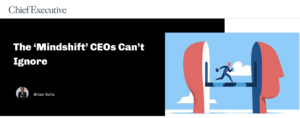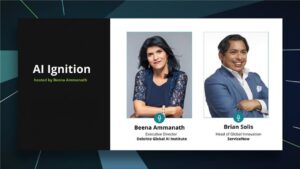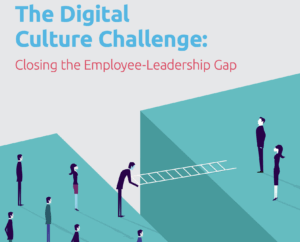
Some of you know me through my work in studying how social media and disruptive technology impact business and culture. Others have worked with me in translating insights into action and change within the enterprise. Every now and then, I share another side of myself that evokes the aspiring social scientist in me as I explore how all of this is affecting us as individuals and human beings.
Not a day goes by when I’m not asked about whether or not the social media bubble will finally burst. Twitter, Facebook, Google+, Foursquare, Pinterest, this all has to be too much right? More often than not, I’m expected to assume the role of psychologist to either validate their digital existence or help individuals understand, and in some cases cope, with what is most often diagnosed as information overload.
This isn’t a new phenomenon by any means. The sensation of being overwhelmed by information has been linked to every media revolution. With every new innovation and the mass adoption of disruptive technology, the volume of information available to us grows exponentially. With media now so pervasive and portable, information, of any focus, is available, on demand, and more importantly, resides in our hands to create and consume at will. We are, for better or for worse, always on. And this is both part of the problem and part of the solution for how we evolve as individuals and as an information society.
Social media has gifted us a new democracy. And with it, the ability to connect to people around the world and create, share, and devour knowledge, entrainment, and irrelevant information at will. It’s as intimidating as it is beautiful. We have passed the Attention Rubicon and there is no turning back. The towers of social media will not come crumbling down upon the foundation of a former reality when we or the generations before us led a much simpler life. The key for us now is forged in self-control or some form of aspirational governance that focuses our connects and interactions.
Indeed, there is a very real human cost of social connectivity. But, the symptoms of information overload are only a reflection of our inability or lack of desire to bring order to our chaos. See, we are the engineers of the media levees that prevent overflow.
The challenge lies not in the realization that we are empowered to curate our social streams and relationships, but in the consciousness of what is and what could be. Meaning, that we must first understand that how we’re connecting, consuming, and creating today is either part of the problem or part of the solution. We, and only we, are in control of information overload and everything begins with acceptance.
Where do we fall in the contrast of where we are and where we want to be? For these dichotomous positions are separated only by our vision and actions. But even still, with the glut of information and the overwhelming sense of responsibility to duly engage, we succumb to fatigue.
Like in anything, there’s a dark side to all of this. One of the quiet perils of living in an always-on society is the need to stay connected. In part, we’re driven by relevance or the fear of irrelevance. If we are always part of the conversation, we remain top of mind. Additionally, we’re driven by a sense of vanity. We need to see what, if anything, people are saying about us, how they’re reacting to our engagement, and who others are talking about or to whom they’re connecting.
There’s a perpetual sense of “missing out,” which is I think at varying levels, true for all digital denizens. These networks after all are homes to very emotional exchanges. We laugh, love, fight, cry, but most of all, we live…and for some of us, we live online differently than we live in real life. The difference is, to what extent are we compelled to plug in and participate, how often, for what duration, and at what emotional depth. The answer either defines are digital lifestyle or our digital lifestyle defines us.
In 2010, Pennsylvania’s Harrisburg University of Science and Technology introduced a week-long ban of social media in an effort to curb the media diets of students. What was the inspiration for the ban? According to Harrisburg University provost Eric Darr, stress and potential addiction played strong roles in the cold turkey experiment.
Darr shared his concerns in an interview with Fast Company, “I’m sure that we have some students who are clinically close to addiction…that aside, it’s clearly the case that this set of technologies has the possibility of taking over our lives.”
Following the ban, the university conducted surveys that revealed some disturbing realities. One such result was the level of duress students were under in checking status updates on a variety of social media sites. Sound familiar? Roughly 15% of students admitted to spending between 11 to 20 hours on social media sites such as Facebook every day. This reminds me of the science fiction novel by Philip K. Dick, “Do Androids Dream of Electric Sheep.”
Our digital lives will only become far more challenging to manage. With smart phones, tablets, in-car technology, wifi in public spots in addition to planes, trains, and automobiles, the temptation to connect is pervading. And it doesn’t just stop there. Social networks are investing technology and marketing in expanding your online relationships. Through recommendation engines, they lure you to link outside of your social graph, those you know to now form an interest graph, those with whom you share common interests.
Information overload is a real phenomenon, but it is I believe, by design. It either works for us or against us and it is our choice as to which way the stream flows. To be clear, information overload is a symptom of over consumption and the inability to refine online experiences based on interest and importance.
Early in 2012, I hosted a poll across Twitter, Facebook, and Google+ to get their perspectives on information overload. I asked a simple question, “Do you suffer from information overload because of social media?” The answers were revealing…You can see the detailed results here (comments are worth reading too).
Just over 800 people in 41 countries responded and the results while scattered, told a compelling story. If we look at a simple take on yes or no, only 14% say that they feel overwhelmed with 21% affirming that they are in control of their online experience. Another 57% however feel that they are sometimes overwhelmed with social media, but they do believe it’s in their hands to manage. Interestingly, when you combine Yes, Sometimes, and “I’m addicted,” you can get a better idea of the pervasiveness of information overload, or aspects of it.
In his new book, “Too Big to Know,” good friend David Weinberger shares why Information overload is our new golden age. Weinberger believes that facts have been replaced by “networked facts,” which are the result of a collective repository of shared experiences and exchanges in any digital network. In his book, Weinberger makes the case that technology can now easily feed our endless curiosity. And, as a result, how we learn, connect, interact, and work is forever changed…for the better.
Access to information and people is intoxicating. Creating an online portrait of who we are or who we want others to see is equally alluring. But without direction, governance, and discipline, we are at risk of giving ourselves to the very networks we value rather than managing the platforms to our advantage. Our participation must be inspired by purpose and parameters. No, we are not obligated to connect with everyone who connects with us. We are obligated to maintain balance in who we are, what we value, and equally the value we invest in the communities in which we participate.
As Clay Shirky once observed, “There’s no such thing as information overload — only filter failure.”
My take? “Information overload is a symptom of our desire to not focus on what’s important.” It’s a choice.
Perhaps said another way, information overload is a symptom of our inability to focus on what’s truly important or relevant to who we are as individuals, professionals, and as human beings. But then again, maybe that’s the problem.
The reality is that we are learning how to use these networks and what to expect in return. We’re learning what’s possible. However, we learn as we go. We discover where the proverbial line is only after we’ve crossed it or are witnesses to those who do. Our teachers, parents, role models and peers, they to are just coming to grips with the evolution of social media and digital culture as it affects online and offline behavior along with us. Therefore, this is a time when we are all students. But at some point, we must also become teachers
Connect with me: Twitter | LinkedIn | Facebook | Google+
Please consider ordering The End of Business as Usual today…





It’s all about time management and priorities. As social beings we are easily drawn to the desire to be in the group and an active participant. Social relevance is eternally attractive. The will and the means to be successful and ultimately significant requires personal effort and commitment – which is too often replaced with our social tendencies. Whatever the individual’s habits, they will always be focused on the most emotionally desirable motive. It’s habit.
Fascinating article. The reluctance to accept new things seems to be diagnostic of the human condition. From the automobile to the microwave to the personal computer to social media: each new technological trend is viewed with skepticism by the generation that preceded it. I suppose augmented reality is next? In any event, the cycle seems eerily similar to the grieving process, from initial shock to final acceptance.
Thank you; insightful article. I focus on the email part of overload and believe, workwise, you must manage your email to a near empty inbox daily. Relative to your priorities, most overload email should be eliminated. Bob
great post as usual, brian!
Thank you Davide…
Great, thought provoking post.
I could not agree more. Thought you summed it up well with your Clay Shirky quote “There’s no such thing as information overload ~ only filter failure.” And just moments before I read your blog I watched this TED Talk that I think you’ll find VERY interesting as the Social Scientist that you are ~The Optimism Bias : http://www.ted.com/talks/tali_sharot_the_optimism_bias.html
Nice post! But I think its up to any person who using social media to what purpose he/she wants to use them and what information they want to get. Any thing has two aspects bad or good its upto the person which side he chooses.
I agree with so much in this article it prompted me to comment. I think the crux of the matter is why do we feel the need to constantly connect online, are we missing something our in personal lives, the real world. Are we lonely or is it attention seeking on a grand scale? I noticed you list vanity as part of the obsession for social media, perhaps. Vanity would explain why one snippet of news is circulated to the nth degree on Twitter, blogged about by experts in the field and then by non-experts, followed, commented upon, opinions provided, discussed, elaborated. It’s self –perpetuating and almost impossible to ignore. I suggest fear plays a part, the worry that you may have ‘missed’ something, especially if it’s within your field of interest. I feel that social media is now a part of our evolution and that to get to where we are inevitably heading, the ‘Wisdom of the Crowd’ is the only way to get there.
Brian,
Fortunately I’m thinking the all the soc media info coming in that speaks to “new social media schools, rules and tools” is going to experience a brief slowdown… which – in a way will give everyone a chance to take a breath…It seems most eyes are on the the impending FB IPO. Not surprising that GM pulled its’ ads ahead of going public is it? They can get back on board later… New studies coming out right now that point to lack of consumer ad clicking and lack of trust etc. are real and I think need to be looked at. While it is way early in the game, there is little doubt business leaders will watch and wait to see what becomes of FB. The leadership, privacy (trust), monetization models and actual value to advertisers issues will and should be understood. The fact that FB has not articulated a mobile strategy does not help. This is a great real world test. This will help set expectations and I’m hoping allow senior managers
to become a little more comfortable with the soc media phenomenon. The sky
is not the limit – mgt. in this climate are not risk takers. All this will speed up again I’m guessing in the post FB IPO days after the financial and social analysts have their say. This as you know is all part of the non linear evolution. As we begin to walk upright all systems are affected… The half full optimist will have their day but – in the fullness of time yes?
excellent post! i am really glad I read this post. I am looking forward for more post from you.
Part of the challenge is understanding that this information has always been out there, however, these new social media tools have created a fire hose effect to the flow of available data and a sense of urgency as to how quickly it must be consumed, thus we feel overwhelmed. Everyone wants to feel relevant. Posting online in any format, offers the opportunity to be heard or seen by the world. We are like moths to a flame, posting and consuming furiously without thoughts of purpose or effect. What we need to realize is that it is up to us as individuals to define our relevance, create our own list of priorities and consider that the world will still turn whether we are online or off. We need to insist on a technology break when we need it, whether from work or from friends. We need to understand our role as ‘data’, as we eagerly share personal information on our free platform of choice. In short, the more urgency we feel to participate, the more we need to consider what our participation should be such that we have a voice in defining how we interact. I don’t agree that ‘Information overload is a phenomena by design.’ It is the result of a change in the way we interact with the world. But I do agree, Brian, that it requires our thoughtful participation.
I agree with what you wrote, “information has always been out there”. Thanks to social media tools, we can already grasp the information that we need and weed out those which we don’t need. It’s really a matter of deciding which are relevant or not.
We have a firehose of info coming at us, and learning how to consume any of it is a trick. At best, we consume and use only a very very small bit. And what we do consume, you are dead on, is a pure choice. How to CHOOSE WELL is the issue for me. I’m wondering if any of your readers know the name of the skit created by the BlueMan Group- I first saw in an intimate theatre in Chicago. . . three flip charts- three blue guys. The first page on all charts reads “Don’t even try to read all these messages. Choose one”. Each guy begins to slowly flip, but only gives you enough time to read one chart. If you try to read them all, you miss the message entirely. If you read just one, you get the point of the whole thing. One point. You end up feeling tense and frustrated and almost guilty for what you missed, as if the world will stop turning if you didn’t read one of the pages. It’s an apt visual of how to handle the firehose. Choose your stream. We homo sapiens unfortunately gravitate to info we like, and though we have more info, more info seems to make us become more polarized. May we expand our reach and go outside our own world. Hear what others are saying, even if it isn’t pleasing to our ears, as true hearing increases understanding. Then let it work. Instant rebuttal abounds with social media. Many psychologists agree that an instant direct response from those considered peers is the most effective way to change social behavior- more quickly than rules. So the benefits of info overdose outweigh the alternative on any given day. We have such boundless opportunity coming our way, and such immense responsibility for how we use it. Its awesome to think about. God speed to all on the info superhighway. If anyone knows the name of that skit, I’d love to find it.
I too am curious…thank you for sharing.
Brian,
Thanks as always for a thought pro
There is a lot of great insight in this article and I agree that as a student myself, social media does provide a distraction throughout my day. However, I also think that the problem isn’t necessarily the time people spend on social media. It was created to increase our connectivity and share ourselves in a new and convenient way. The problem is when companies try to change the way we use social media to put attention on businesses and brands. Social media was never made to advertise and create a new competition platform for companies. It was made to use between our friends and family and become more easily connected on a day-to-day basis.
Undoubtedly, we are in an era of information overload – there simply is vastly more information than used to be. But on the other hand “information overload” implies than be are being subject to something we can’t get away from. That is certainly not true. We are willingly embracing, and even chasing this information. I wouldn’t call it information overload, I would call it is a folly of our times.
Howard Rheingold’s latest book “Net Smart” provides a thorough and searching exploration of this and a number of related issues. He provides specific tools and strategies that train the reader how to build individualized radars, how to curate feeds, generate a coherent social persona, and how to participate in “cellularized” work structures. he’s even invented a term “infotention” that describes “the psycho-social-techno skills we all need to find our way online today, a mind-machine combination of brain-powered attentional skills with computer-powered information filters.”
I think you hit it—priorities. Too often we are sucked in rather than strategically marching in to accomplish what we want and need. I thought the other point of what is called overload is a perception of deprivation if we DON’T keep up. We don’t want the feeling (not fact) that we are missing out and therefore somewhat irrelevant. Social media has seemingly created its own cultural norms that participation is everything, and if you are not in it, you are nobody. I sometimes find that I have to resort to the old-fashioned timer to make sure I accomplish my priorities. I’m allocating X amount of time to this and then it’s done. Period.
Fascinated by article, and puzzled at the same time.@ brian, do you believe companies have a moderating role in the informatio overlaod. Would it help, if they, somehow, could filter information to consumers by pre-filtering it based on consumer profile ? And if so, isn’t there a risk that you will show the wrong info to the wrong people (since consumer profiling for information is not an easy thing to do) ? Or is the filtering solely to be done by the readers itself ? BR, Steven
Youre so cool! I dont suppose Ive learn anything like this before. So nice to find someone with some original ideas on this subject. realy thank you for starting this up. this web site is something that is needed on the net, someone with somewhat originality. useful job for bringing something new to the internet!
Ted talks and Clay Shirky Optimism won’t neglect the real true about our ability to meaningful be concerned with a limited amount of information.
I think that there is so much information and so many opinions, sometimes it’s hard to know whats right. Not about filtering but trying to figure out who to trust, including yourself. I think this is especially true in areas like financial services, health or parenting. This especially true for older generations.
Choice– that’s what the tobacco and fast food sellers tell us too…. good for you. We know know your delusion:)
No one said it isn’t habit forming… 😉